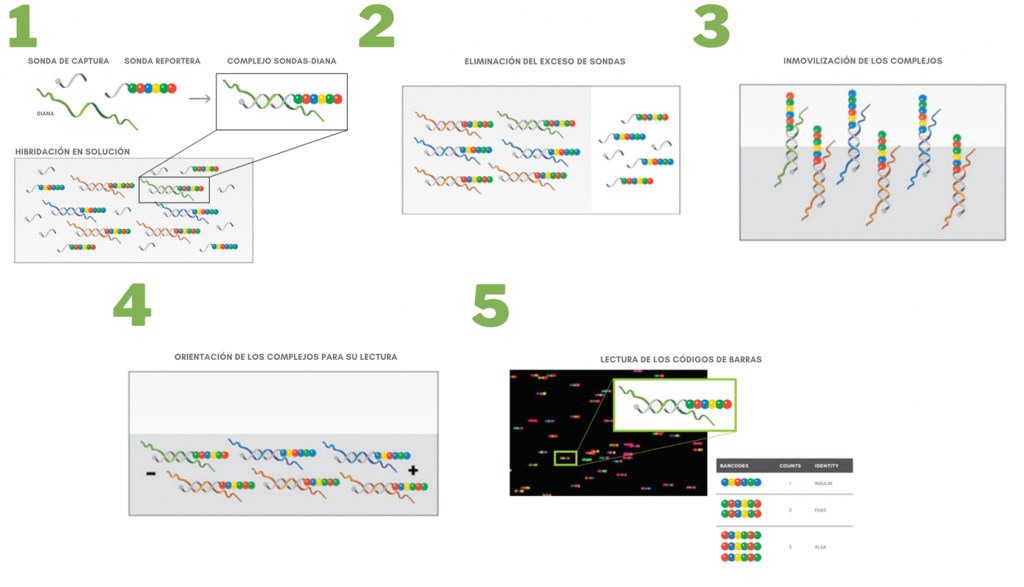nCounter | NanoString
CITOGEN offers any research centres and/or laboratories that wish to benefit from NanoString technology but lack the equipment to analyse samples the possibility of doing so at our laboratory.
Once the project is known, our experts will help you choose the most suitable panel for your study. Depending on the protocol to be applied, the samples will be processed in the appropriate equipment and the results will be shared for analysis.
The NanoString® nCounter® platform is a fast and simple solution for multiplexed analyses of up to 800 RNA or protein targets, without any need for amplification, cDNA conversion or library preparation.
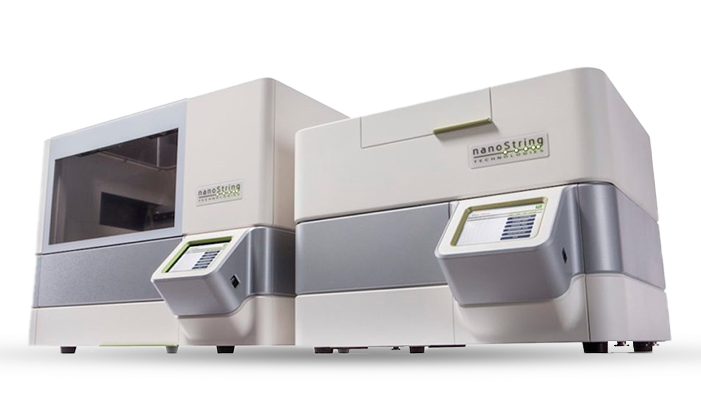
Why choose the nCounter platform?
Time Savings
- Faster and easier than other similar techniques, such as qPCR, microarrays or RNA-Seq
- Manual procedure only lasts 15 minutes
- Expertly designed (customisable) commercial human and mouse gene panels
Error reduction
- No reverse transcription of RNA to cDNA nor prior amplification, which may lead to biases, errors and variability
Sample Savings
- Optimised protocols for complex samples, including FFPE tissue or lysates
Resource Savings
- Availability of advanced data analysis tools, reducing the need for bioinformatics support
- Digital analysis of gene expression, doing away with the need for technical replications
Exceptional reproducibility
- Full automation
- High sensitivity and accuracy
- Digital quantitative data
- Quality assurance (ISO 13485 certificate and GMP compliance)
How does it work?
NanoString nCounter technology is based on a molecular barcode’s digital detection (color-coded) bound to a specific probe (reporter probe) for the gene under study. In addition to this probe, another specific probe (capture probe), which is bound to the first one covalently, hybridises with the target sequence to allow for immobilisation of the complex formed by the target sequence and the probes.
Any excess probes that have not hybridised are subsequently removed, and the purified complexes are immobilised and oriented for signal scanning by an automated fluorescence microscope. The data thus generated (CSV files) may subsequently be analysed with the free NanoString nSolver™ analysis software.
What is the process?
Query/Advice from our experts
Panel Selection
It is equipped with a variety of expertly designed and verified panels for both RNA and proteins. You can additionally customise them.
Sample Selection
Data Reception
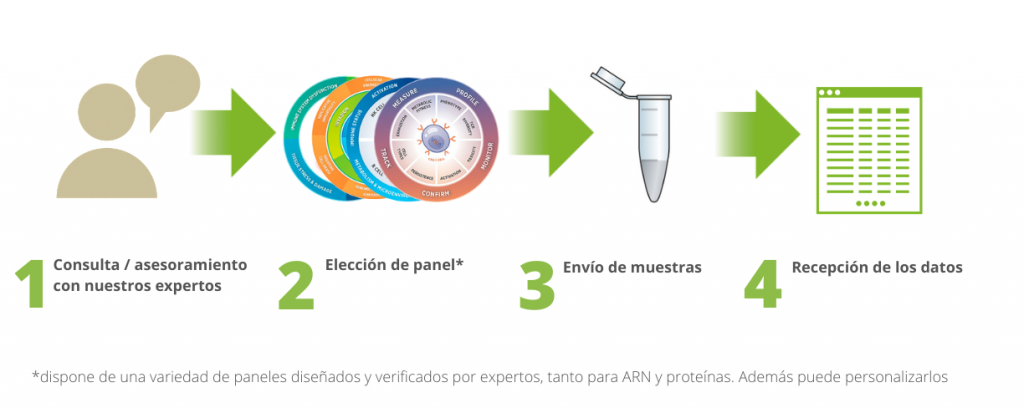
Available panels
Immunology
- Autoimmune Discovery Panel: Study of the relationship of germline variants associated to autoimmune diseases and gene expression.
- Autoimmune Profiling Panel: Study of relevant genes in autoimmune disease, chronic inflammatory disease and adverse effects associated to immunotherapy (human panel and mouse panel).
- Fibrosis Panel: Study of genes involved in the fibrosis process.
- Host Response Panel: General study of the individual’s (human being or mouse) immune response against infection.
- Human Organ Transplant Panel: Study of the individual’s immune response to the transplanted organ.
- Immune Exhaustion Panel: Study of the expression of genes involved in the depletion of T, B and NK cells in several contexts, including cancer and infectious diseases.
- Immunology Panel: Study of the expression of genes related to immunology.
- Inflammation Panel: Study of the early inflammatory response.
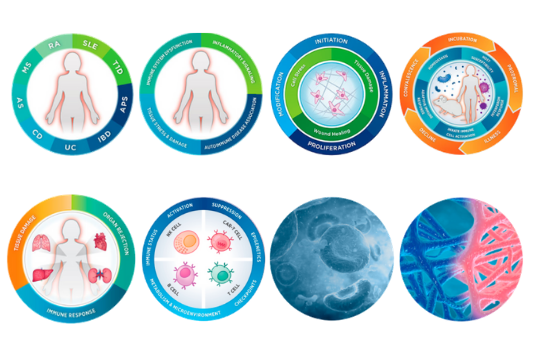
Oncology
- Breast Cancer 360 Panel: Study of the expression of the genes involved in the biology of breast cancer, including the microenvironment and the immune response.
- PanCancer Immune Profiling Panel: Comprehensive study of the immune response optimised for immuno-oncology research, including essential tumour biology genes and the tumour microenvironment.
- PanCancer Immuno-Oncology 360 Panel: Comprehensive study of the genes involved in tumour immune evasion and in the response to immunotherapies, including genes essential for the tumour microenvironment and the immune response.
- PanCancer Pathways Panel: Comprehensive study of the genes involved in the main pathways affected by cancer, including genes essential for the tumour microenvironment and the immune response.
- PanCancer Progression Panel: Study of genes involved in the processes and mechanisms involved in cancer progression, including genes essential to tumour biology, the tumour microenvironment and the immune response.
- Tumour Signalling 360 Panel: Comprehensive study of altered cell signalling pathways in cancer, including essential genes of tumour biology, the tumour microenvironment, and the immune response.
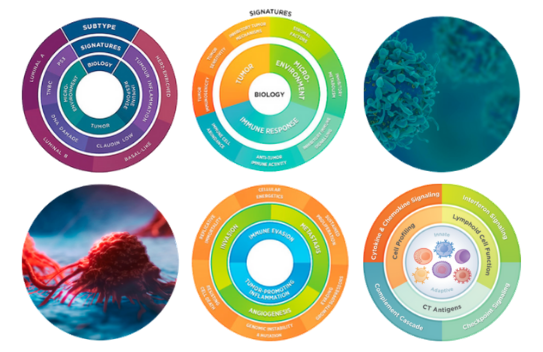
Immuno - Oncology
- CAR-T Characterisation Panel: Gene expression study aimed at developing therapies with CAR-T cells.
- Myeloid Innate Immunity Panel: Complete study of the gene expression of cells derived from the myeloid line.
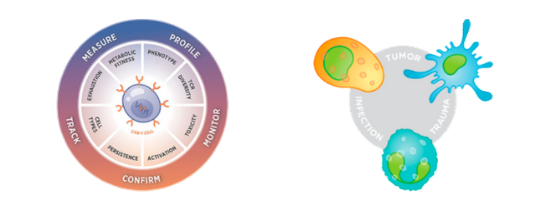
Neuroscience
- Alzheimer’s Disease Panel: Study of the expression of genes related to Alzheimer’s disease.
- Glial Profiling Panel: Comprehensive study of the gene expression of astrocytes, microglia and oligodendrocytes, allowing for a better understanding of neurodegenerative and neuroinflammatory diseases, as well as neurotraumas.
- Neuroinflammation Panel: Comprehensive study of the expression of genes involved in pathways, processes and cell types involved in neuroinflammation.
- Neuropathology Panel: Study of the expression of genes involved in six fundamental aspects of neurodegeneration: neurotransmission, neuron-glia interaction, neuroplasticity, cell structure integrity, neuroinflammation and metabolism.
Stem cells/regenerative medicine
- Stem Cell Characterisation Panel: Gene expression study aimed at the development of stem cell therapies.
Obtain further information on these types of studies by getting in touch with us:
Let’s talk
Our team of specialists will get in touch with you as soon as possible to sort out any doubts you may have.

